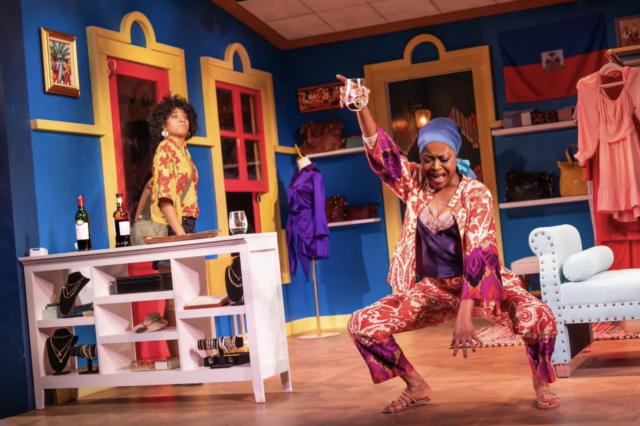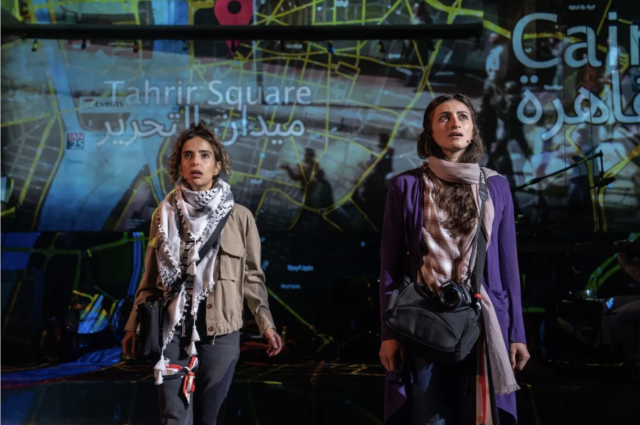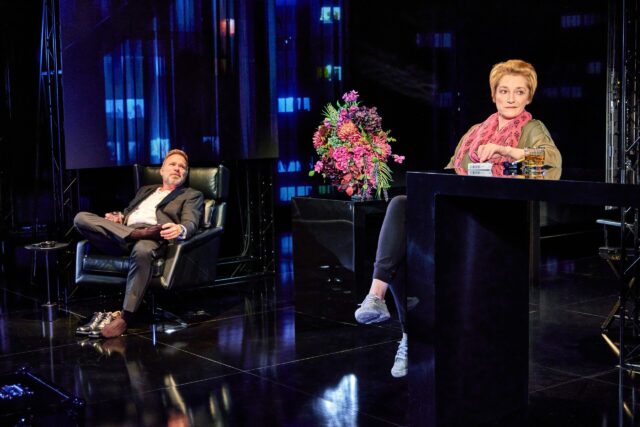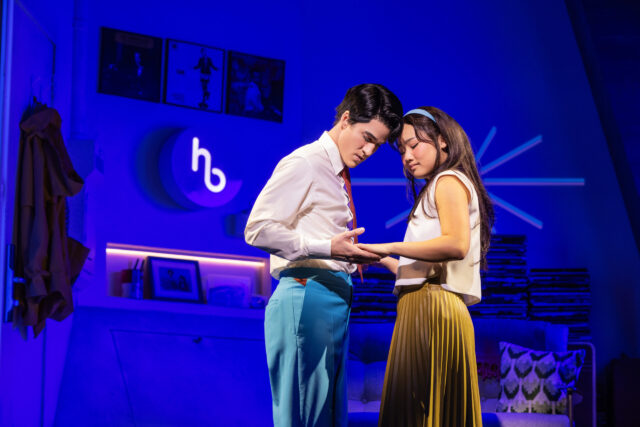
Peter Gallagher and Juliana Margulies star in Delia Ephron’s Left on Tenth (photo by Joan Marcus)
One of the most fun parts of being a theater critic is engaging with your fellow stage pundits. We greet one another before and after shows and during intermissions, discussing what we’ve seen lately that we’ve liked — and what we haven’t.
We have an unofficial community on social media, where we post our reviews and comment on those of others. While some appreciate different opinions, acknowledging that we all approach theater with personal biases, both conscious and unconscious, others are more insistent that their take is right and anyone who disagrees got it wrong.
One particular critic becomes dismayed on those rare occasions when she and I actually agree on a show.
Like I said, it’s fun.
But it can become disheartening when you find yourself on the opposite side of the fence from nearly all of your respected colleagues, which has happened to me often these last few extremely busy weeks.
I was charmed and delighted by author and screenwriter Delia Ephron’s Left on Tenth at the James Earl Jones Theatre, her adaptation of her 2022 memoir about finding love at the age of seventy-two shortly after losing her husband, Peter Kass, and right before finding out she has acute myeloid leukemia (AML). Julia Margulies stars as Delia, who often breaks the fourth wall and talks directly to the audience. Speaking of her childhood, she explains early on, “Every time I said something funny, my dad shouted, that’s a great line write it down. All four of us sisters grew up to be writers. But my parents were also angry alcoholics. My childhood was scary, often violent. With Jerry, I found my first true home. My first safe place. Now he wasn’t going to be here . . . Now . . . what?”
After writing an article in the Times about the trouble she had reconnecting online when Verizon canceled Jerry’s landline and, mistakenly, her internet access, she is contacted by Peter Rutter, a Jungian psychoanalyst who had briefly dated her in college, even though she does not remember him. Peter is elegantly portrayed by the ever-handsome Peter Gallagher. They rekindle their once-upon-a-time almost-relationship with passion and excitement — yes, older people can get hot and heavy — and he stands by her when she is hospitalized and things look bleak.
The play is directed by five-time Tony winner Susan Stroman and features Peter Frances James and Kate MacCluggage as multiple characters who make unbelievably fast costume changes. Although the show does get treacly, there was more than enough quality scenes for me to recommend it. My colleagues have not been kind to the play, writing, “Left on Tenth has the energy and the color scheme of a drugstore greeting card,” “Left on Tenth, billed as a romantic comedy, only fulfills half that description,” and “more suitable to the Hallmark Hall of Fame than Broadway.”
Although I don’t think so, perhaps my longtime admiration of Gallagher got in the way of my judgment? Thirty years ago, my wife and I moved into an apartment that was previously owned by him. (There was a lawyer in between who purchased it but never lived there, selling it to us.)
About twenty years ago, I met Gallagher at Powerhouse Theater’s annual New York Stage & Film benefit in Manhattan. Standing behind him, I said my address out loud so he could hear me. He whipped around and barked, “Who are you!” I calmed him down and explained that I now was in that apartment and told him that we occasionally still received junk mail for him. We talked about some of the unique advantages to the place. He then turned serious.
“You have to promise me something,” he said. “What?” I asked. Peter: “Is the yellow bookcase in the hall still there?” Me: “Yes.” Peter: “Promise me you’ll never take it down.” Me: “Why?” Peter: “Because I built in with my own two hands.”
I couldn’t help but think of that bookcase as I entered the James Earl Jones Theatre and saw that Beowulf Borritt’s main set is anchored by a gorgeous, filled-to-the-brim semicircular bookcase in Delia’s apartment. (It switches between that room, a restaurant, and the hospital where Delia is treated.) Books are discussed throughout the hundred-minute play; having worked my entire career in children’s and adult publishing, that was another plus for me, especially because it got the details of the industry right, which is rarely the case in theater, TV, and movies.
However, four other shows left me cold and dry, awash in disappointment.

Cousins Simone (Kelly McCreary) and Gigi (Pascale Armand) try to reconnect in Dominique Morisseau’s Bad Kreyòl (photo by Matthew Murphy)
Over at the Signature, I was all set for Dominique Morisseau’s Bad Kreyòl, a coproduction with Manhattan Theatre Club that has been extended through December 1. The Detroit native has been on a thrilling roll with Pipeline in 2017, Paradise Blue in 2018, Skeleton Crew and Confederates in 2022, and Sunset Baby earlier this year. Maybe it was a bad night — critics generally have several performances to choose from, so they are not seeing the same exact show — but Bad Kreyòl felt like a work-in-progress, unfinished, its characters not yet fully developed.
Simone (Kelly McCreary), a Haitian American, is returning to the island for the first time in thirty years, staying with her cousin Gigi (Pascale Armand), who runs a boutique with the help of Pita (Jude Tibeau), a gay restavek whose rural family sent him to the city when he was a child in order to get an education and learn a trade. Simone is concerned that the restavek system means Pita is more like an indentured servant; she is also worried about Lovelie (Fedna Jacquet), who sews pillows, ties, scarves, and other items for an import-export company run by Thomas (Andy Lucien), who might be ignoring how women workers such as Lovelie are being abused by one of his male employees. Simone, Gigi, and Pita feel out of place in their dangerous country; they run into trouble as they try to firmly establish their identities and decide what they want out of life.
The night I went, the Irene Diamond Stage at the Signature was about half empty. The audience was almost too quiet during the show’s two hours and fifteen minutes (with intermission) as jokes fell flat and key moments flirted with clichés. Directed by Tiffany Nichole Greene, the play felt muted, lacking energy; I was more interested in the person sitting off to the side who kept taking photos and short videos of the drama.
Meanwhile, here’s what some of my colleagues had to say: “an illuminating reminder that Haiti and its people are much more than just bad headlines,” “a story told with care and intelligence, both warm-hearted and sharp-eyed,” and “confirms her as one of our most consistently interesting playwrights; where will she take us next?”

A young, energetic cast appears in the Lazours’ We Live in Cairo(photo by Joan Marcus)
In the early 2010s, I saw Stefano Savano’s intense documentary Tahrir: Liberation Square and Jehane Noujaim’s powerful fiction film The Square, extraordinary works about the 2010 Arab Spring in Egypt. So I was excited for New York Theatre Workshop’s We Live in Cairo, a musical by Daniel and Patrick Lazour, directed by Taibi Magar, that follows a group of twentysomethings risking their freedom and safety as they carefully take part in the resistance against President Hosni Mubarak and the Muslim Brotherhood during the revolution of 2011.
The score, performed by an onstage band, is sensational, and Tilly Grimes’s ramshackle set is evocative, as are David Bengali’s street-art projections. But the lyrics and staging are too plain, and the acting is merely standard — and I don’t know what I was going to do if one more character ran out in a tizzy through the door at stage left. At two and a half hours with intermission, the show is too long; perhaps it would have been more effective if it had been condensed into a streamlined ninety minutes.
While We Live in Cairo did not receive across-the-board raves, here are some of the favorable quotes from professional reviewers: “a welcome blast of excitement and intelligence,” “underscores the appeal, the importance — and the fragility — of democracy,” “pulses with the promise and enthusiasm of idealistic youth,” and “the most hypnotic, moving, and unique original score so far this year!”

Erika Sheffer’s Vladimir traces one journalist’s attempts to take on Putin (photo by Jeremy Daniel)
Although it closed November 10, MTC’s Vladimir also baffled me. The first act was so unsatisfying that I told my guest that I wouldn’t mind if she went home, but I had to stay for the second act, as is my responsibility. She stayed, and the second act was significantly better, but not enough so to recommend it.
Erika Sheffer’s play was inspired by the real-life story of Russian journalist Anna Politkovskaya, who continued to write negative reports about new Russian president Vladimir Vladimirovich Putin and his government even after she was poisoned. Mark Wendland’s overdesigned set with seemingly endless screens makes you wonder where you should be looking. Francesca Faridany is fine as Raya, but the rest of the cast — two-time Tony winner Norbert Leo Butz, Erin Darke, Erik Jensen, David Rosenberg, and Jonathan Walker — have trouble finding their way through numerous scenes, as Tony-winning director Daniel Sullivan attempts to figure out the convoluted stage. Everything becomes more assured after intermission, although a few of the key subplots border on the absurd.
What did my colleagues think? “Vladimir, beyond many other excellent qualities, feels distressingly current,” “as tough and uncompromising a piece of writing to be seen on a New York stage right now,” “accumulates enough awful truth to leave you sore and shaken,” and “Francesca Faridany and Norbert Leo Butz are towering in this Stoppardian Moscow-set drama.”

Darren Criss and Helen J Shen play Helperbots who fall in love in Maybe Happy Ending (photo by Matthew Murphy and Evan Zimmerman)
Which brings me to the reason I decided to write about this in the first place: Maybe Happy Ending. The instant-smash musical is about two retired Helperbots, Oliver (Darren Criss), a model 3, and Claire (Helen J Shen), the later model 5. They live across the hall from each other in a Seoul apartment complex where they are left to eventually power off forever. They meet-cute when Claire knocks on Oliver’s door because her charger is broken and can’t be fixed — replacement parts for both HBs are disappearing, so it’s clear, and very sad, that their time is limited, just like that of humans. “We have a shelf life, you know that,” Claire explains. “It’s the way that it has to be.”
When Oliver decides to return to his previous owner, James (Marcus Choi), he is joined by Claire for a road trip to Jeju Island; he is sure that James has been waiting years for him to come back because he needs him, while she wants to see the last colony of fireflies on the planet.
Director Michael Arden’s staging is nothing short of spectacular on Dane Laffrey’s magical set. Rectangular boxes open and close on a black screen, revealing the HBs’ differently decorated apartments similar to the way silent films irised in and out of scenes. Red LED lines stream across the screen. Crooner Gil Brentley (Dez Duron) rises from below to sing jazzy tunes. Round shapes are everywhere, representing the circle of life (for robots and humans), from windows, Claire’s soft and pillowy chair, and the moon to the HB logo, images on jazz posters, and Oliver’s beloved records, which he plays on an old-fashioned turntable. It might be 2064, but it’s jam-packed with nostalgic elements from the twentieth century, while George Reeves’s projections are filled with magic.
So why were my guest and I supremely bored through most of the show’s 105 minutes? The book, by Will Aronson and Hue Park, is littered with gaping plot holes that drain the narrative, while the music, by Aronson, and the lyrics, by Park, are more saccharine than sweet. Criss and Shen do an admirable job as the HBs, the former stiff and steady, the latter freewheeling, referencing how technology, especially AI, is becoming more human and personable. But I was not able to get past the numerous shortcomings and found the Brentley character wholly unnecessary and distracting.
Alas, nearly every other reviewer has been gushing with effusive praise: “In its gentle robot way, it helps us see ourselves through freshly brushed eyes,” “an undeniably moving, well-made, adorable musical,” “rapturous music and lyrics,” “an original show, charmingly acted and cleverly staged, with a touching take on love,” and “visually stunning, it epitomizes the journey of appreciation of the human world.”
Of course, when it comes right down to it, I’m right and they’re wrong, as any critic worth his salt should claim, even if, in some cases, I’m alone in, as HB3 calls it, “the world within my room.”
How’s that for a maybe happy ending?
[Mark Rifkin is a Brooklyn-born, Manhattan-based writer and editor; you can follow him on Substack here.]